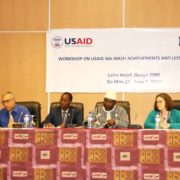USAID WA-WASH has Improved the Living Conditions of over 1 Million
The USAID-West Africa WASH Program started in 2011 in three West African countries – Ghana, Niger and Burkina Faso. It is now nearing completion at the end of 2017. The program’s intervention focus on the Water, Hygiene, Sanitation, Climate Change, Food Security and Environment sectors. Lakhdar Boukerrou, the Regional Director of the program, organised a workshop to present the program’s achievements so to capitalize them in the future. The workshop was held on June 1, 2017 in Ouagadougou, Burkina Faso.
 Through papers, presentations and projections, the workshop participants discovered the program’s achievements by area of activity and location. Because of the program, over 65,000 people in Ghana, Niger and Burkina Faso have gained access drinking water estimated at more than 132 million litres. More than 62,000 people also have improved sanitation conditions through the construction of 8,192 toilets. The program has also facilitated the installation of more than 5,800 water points for hand washing with all necessary equipment. Also trough this program, nearly 10,000 farmers have benefited from better tools and technologies to increase their productivity and improve their resilience to the effects of climate change.
Through papers, presentations and projections, the workshop participants discovered the program’s achievements by area of activity and location. Because of the program, over 65,000 people in Ghana, Niger and Burkina Faso have gained access drinking water estimated at more than 132 million litres. More than 62,000 people also have improved sanitation conditions through the construction of 8,192 toilets. The program has also facilitated the installation of more than 5,800 water points for hand washing with all necessary equipment. Also trough this program, nearly 10,000 farmers have benefited from better tools and technologies to increase their productivity and improve their resilience to the effects of climate change.
Implementation Process
The WA-WASH program, implemented with the support of the Florida International University (FIU), was carried out in two phases. In Phase I (2011-2015), the USAID WA-WASH program worked on innovative implementation approaches to improve sustainable access to drinking water services, adequate sanitation, and food safety. Adaptation to climate change, gender mainstreaming and knowledge management were also themes developed in this phase.
During Phase II (2015-2017), USAID WA-WASH directly supported the USAID Water Strategy. The program also enabled Phase I beneficiaries to serve as trainers and promoters of lessons learned and techniques to benefit their grassroots community.


